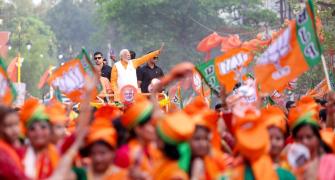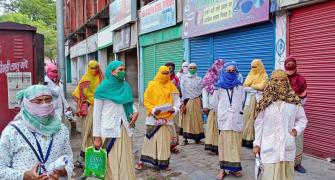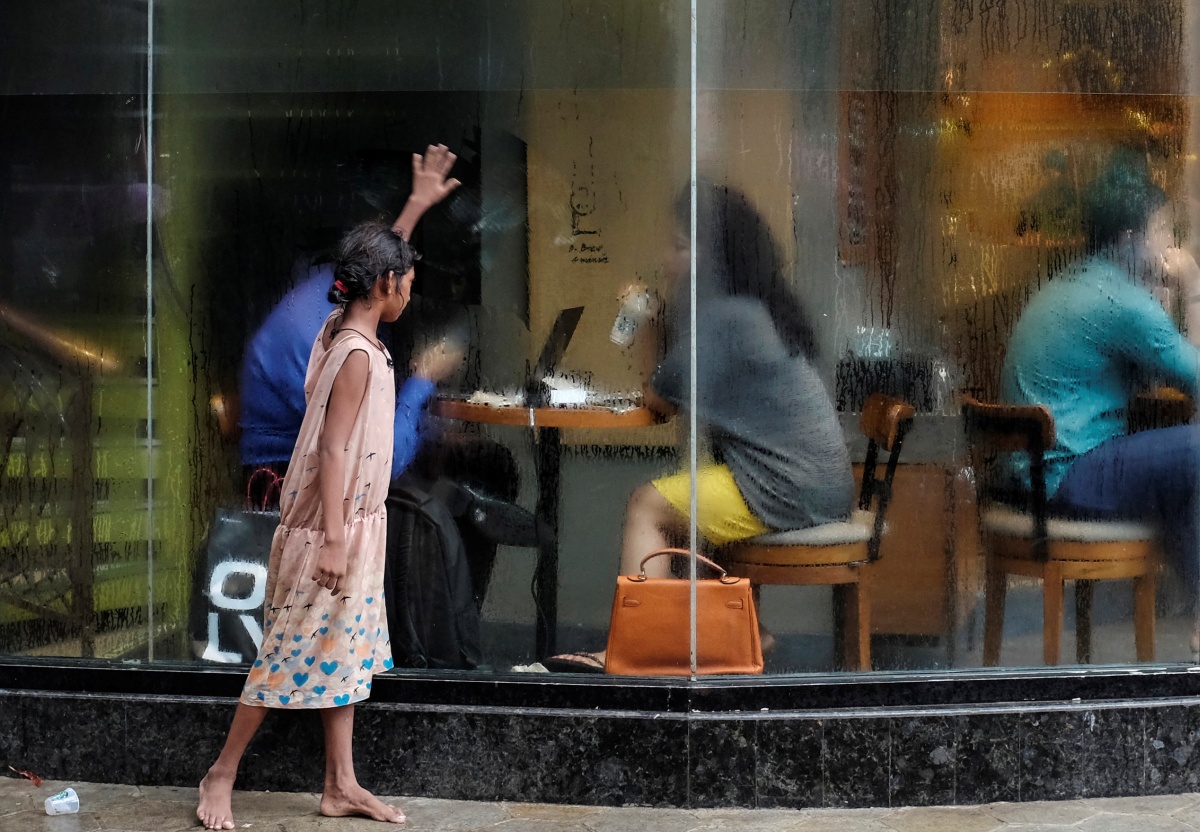'The policy focus of the government should have been on creating more good quality jobs, but that was not their focus.'

"This government has gone to an extreme level by giving incentives and benefits to only cronies who have been allowed to take over everything, from natural resources to ports, airports, etc," Jayati Ghosh, the well known economist and professor of economics at the University of Massachusetts, Amherst, tells Rediff.com's Shobha Warrier in the concluding segment of a two-part interview.
- Part 1 of the Interview: 'Mr Modi Is Rattled'
Some reports say that the unemployment rate for those who are below the age of 25 is a shocking 42%. But the prime minister is not talking about unemployment at all....
They are not talking about unemployment or employment.
Overall employment rates have stagnated, and even fallen if we consider only those who get paid for the work they do.
Even in paid employment, most of the jobs that youth and women are getting is terrible: Either self-employment of the worst possible kind or very low paid, fragile. jobs.
The ruling party no longer talks about unemployment of job creation, they don't talk about inflation, they don't talk about farmers' income.
These were all the most prominent issues Mr Modi raised in campaigning in 2014, but these are no longer mentioned.

Both the prime minister and the finance minister are saying everywhere that the government has created 'unprecedented number of jobs'. Do you think people will believe them?
This is what they have been doing, telling lies again and again. This is the 'Goebbels technique' perfected in Nazi Germany: You keep repeating a lie endlessly until people start believing it. The same lies are repeated by major newspapers, radio channels, TV channels, and so on.
So, those who have no jobs think, 'It's true that I have no job, my friends don't have jobs--- but this is our bad luck, because the economy is doing so well and there are a lot of jobs'. They believe what the media present.
This is the significance of the narrative.
Even so, I am surprised at the extent to which ordinary people are willing to believe this narrative. This is not something expected of the Indian electorate, which before this decade has been really quite smart.

Do we have any real data out in the open that depicts the ground reality of employment?
The Labour Force Survey data, I would say, are approximately reliable. These shows that average real wages are stagnant and haven't increased in the last 10 years!
In fact, wages of some workers like construction workers and 'regular workers', have fallen once price rises are taken account of.
More women -- around 37% of those described as 'working' --do not get any payment for their work, and this does not even count those who do unpaid care work in their homes.
But the newspapers don't pick up these data. When the government says it has created jobs, nobody in the mainstream media questions them. They do not even present the government's own data, which suggests the opposite.

It is said that in the last one year, people working in agriculture has increased from 200 million to 260 million. Is it because there are no jobs that people are going back to the fields?
Yes, there are no other options for them. You should also remember that women are not paid for the work they do in the field.
In no other country, it is counted it as employment when you are not paid. But it is a sign of desperation, and it is a sign that there are no jobs available.

Though the government is talking about the Indian economy as the fastest growing economy in the world, what you witness is jobless growth. Why?
A lot of it has to do with the destruction of informal activities.
We know that in the formal sector, growth doesn't require more jobs. Industries are getting automated, and they don't need more workers to increase output.
In modern services also, they can do more with fewer workers. So, you have to build the small, macro and medium enterprises, if you want to create jobs.
But throughout the last 10 years, they have destroyed informal activities. In 2016, demonetisation was a massive blow to the MSMEs, where every transaction was through cash. It was like obstructing your blood circulation.
Then came the GST which was very complicated for a tiny enterprise. Many went under because of GST.
After that was the Covid lockdown with just four hours' notice. There was no compensation for their losses during an extended period of forced closure.
So, the informal sector suffered massive blow after blow. It is almost a surprise that any of them are left. And yet these account for the bulk of employment in the country.
The destruction of the MSMEs was policy related -- it is not something that had to happen.
 IMAGE: Professor Jayati Ghosh. Photograph: Kind courtesy Professor Jayati Ghosh
IMAGE: Professor Jayati Ghosh. Photograph: Kind courtesy Professor Jayati GhoshA report says that labour force participation rate in India is less than 50% which is 25% less than China's...
Our demography suggests that India's labour force participation should be higher than China, as we have more young people, who should be participating more in the labour force.
The reality is the opposite of what it should be because the Indian economy is not creating enough jobs.
The policy focus of the government should have been on creating more good quality jobs, but that was not their focus.

If you look back at the 10 years of Narendra Modi, where do you think was the focus of his government?
At one level, it is a continuation of the neo-liberal policies that began in the 1990s in which the focus was on large businesses, large capitalists. You give them benefits and incentives, and they will invest in the economy.
But this government has taken it to an extreme level by giving incentives and benefits to only cronies who have been allowed to take over everything, from natural resources to ports, airports, etc.
The government allowed such big business to grow at the expense of small and medium enterprises. That was the focus.
If the hope was that it would create a trickle down, it did not happen. And this is expected because the only way trickle down happens is through more employment generation.
When you are not generating jobs and when the informal sector is made to die, you don't get any trickle down.
Instead, wealth and incomes in India currently defy gravity, as all the wealth is going upwards.
Feature Presentation: Ashish Narsale/Rediff.com










